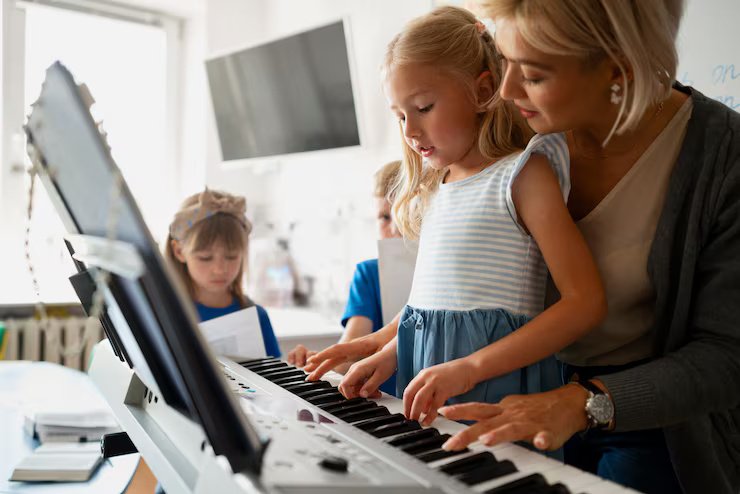Learning to play the piano is a rewarding journey that opens the door to creativity, relaxation, and musical expression. Whether you’re an adult looking to learn a new hobby or a parent exploring piano coaching for kids with no experience, finding the right piano instructor is critical to your musical development.

In this comprehensive guide, we’ll break down everything you need to know about piano coaching, including how to choose the best piano teacher, where to find affordable piano lessons, and tips to make your learning experience successful and enjoyable.
Why Choose Piano Coaching Over Self-Teaching?
While there are countless YouTube videos and self-paced piano coaching programs online, working with a qualified piano instructor provides structure, accountability, and personalized feedback that self-learning simply can’t match. Here’s why proper piano training matters:
- Tailored learning plans to suit your pace and goals
- Immediate feedback on technique and posture
- Motivation and encouragement from an experienced mentor
- Access to graded curriculum and performance opportunities
- Correcting bad habits early, preventing long-term issues
A good piano coach doesn’t just teach you to play notes—they guide your musical journey.
Who Should Consider Piano Coaching?
Piano coaching is ideal for:
- Complete beginners wanting to learn piano from scratch
- Children needing structured piano classes
- Adults returning to piano after years
- Hobbyists seeking local piano coaching
- Aspiring musicians aiming for formal music exams
Whether you’re looking for keyboard coaching, music lessons for beginners, or advanced theory, coaching adapts to your level.
Types of Piano Coaching: What Are Your Options?
Depending on your learning style and lifestyle, you can choose from several types of piano coaching programs:
1. One-on-One Piano Coaching for Adults or Kids
Private instruction offers direct feedback and customized lessons. It’s perfect for:
- Students with unique learning needs
- Individuals preparing for exams like ABRSM or Trinity
- Those looking for flexible schedules
2. Online Piano Coaching Classes
Online platforms offer flexibility, affordability, and access to expert teachers worldwide. Ideal for those seeking:
- Self-paced piano coaching programs online
- Remote access due to location or time constraints
- Recorded lessons to revisit anytime
Popular platforms include:
- Pianote – known for its guided lessons and community
- Skoove – an interactive piano learning app
- Yousician – offers real-time feedback and gamified learning
3. Group Piano Classes
These are more affordable and social. Perfect for:
- Beginners in school or community centers
- People looking for affordable piano lessons near me
- Building confidence through peer support
How to Choose the Right Piano Instructor
Finding the perfect instructor is the most important step in your piano learning journey. Here’s how to do it right:
1. Evaluate Qualifications and Experience
Look for credentials such as:
- Music degrees or diplomas
- Certifications from recognized boards (ABRSM, Trinity, etc.)
- Years of teaching experience
- Ability to teach across genres (classical, jazz, contemporary)
Tip: Don’t hesitate to ask for a demo class or references.
2. Understand Their Teaching Methodology
Ask the instructor:
- Do they offer structured lesson plans?
- How do they evaluate progress?
- What is their approach to theory vs. practice?
- Are they open to teaching your preferred music styles?
This will help ensure alignment with your goals.
3. Look for Passion and Patience
A good music teacher isn’t just knowledgeable—they should inspire and support you. Especially for piano coaching for kids, patience and encouragement are non-negotiable.
4. Check Reviews and Testimonials
Use local directories or music forums to check feedback. Sites like Superprof India or JustDial list verified piano classes and music academies with user ratings.
5. Assess Location or Online Accessibility
If you’re looking for local piano coaching for hobbyists, proximity matters. For remote learners, test the quality of their online setup (camera angles, audio clarity, internet speed, etc.).
Key Qualities of a Great Piano Instructor
When selecting a piano teacher, keep an eye out for these traits:
- Communication skills – Can they explain concepts clearly?
- Adaptability – Can they modify lessons based on your progress?
- Friendly personality – Do they create a positive, non-judgmental environment?
- Focus on fundamentals – Do they emphasize proper technique and posture?
- Balanced curriculum – Includes sight-reading, improvisation, theory, and ear training
These elements make learning enjoyable and sustainable.
Red Flags to Avoid in a Piano Instructor
- Overly rigid teaching styles
- Lack of enthusiasm or attention
- One-size-fits-all lesson plans
- No progress tracking
- Unwillingness to answer questions or explain again
If you feel demotivated or stuck, it might be time to switch.
How Much Do Piano Coaching Classes Cost?
Pricing can vary based on location, instructor experience, and lesson duration. Here’s a rough breakdown:
| Type of Lesson | Approximate Cost (India) |
|---|---|
| One-on-One (Offline) | ₹800 – ₹2000 per class |
| Online Private Sessions | ₹500 – ₹1500 per class |
| Group Classes | ₹300 – ₹800 per class |
| Music Academy Monthly Subscription | ₹1500 – ₹4000 |
| Self-paced Online Courses | ₹1000 – ₹3000 (lifetime) |
For those looking for affordable piano lessons near me, consider group classes or online platforms.
Where to Find Good Piano Coaching Near You
Here are some ways to search:
- Use platforms like UrbanPro or Sulekha for verified local tutors
- Visit nearby music academies and request a trial class
- Ask friends or family for recommendations
- Use Google Maps with search terms like “piano coaching near me” or “piano instructor in [your city]”
Step-by-Step Piano Coaching Guide for Beginners
- Start with Basic Piano Tutorials
Learn finger numbers, key names, posture, and basic hand positions. - Practice Simple Songs
Start with easy melodies like “Twinkle Twinkle Little Star” to build muscle memory. - Learn Music Notation
Reading sheet music opens access to endless songs. Your coach should guide you through this step. - Explore Scales and Chords
These are foundational elements in any song. Practice regularly. - Build Technique and Expression
Work on dynamics (soft/loud), tempo (speed), and articulation. - Record Your Practice
Reviewing your own progress helps identify areas to improve. - Play with Both Hands
Coordination is key. Start slowly and increase complexity over time. - Attend Recitals or Online Challenges
Performance experience boosts confidence.
Piano Learning Tips for Fast Progress
- Consistent Practice: Aim for 20–30 minutes daily
- Warm-Up Exercises: Always begin with scales or finger drills
- Use a Metronome: Helps develop timing
- Record Yourself: Analyze your play for improvement
- Break Songs into Sections: Master small parts before attempting the whole
- Stay Patient: Progress may be slow, but it’s worth it
For more structured techniques, check out resources from MusiciansWay—a trusted blog on practice strategies and performance psychology.
Should You Choose a Music Academy or a Private Teacher?
| Feature | Music Academy | Private Teacher |
|---|---|---|
| Structure | Formal curriculum | Custom learning plans |
| Peer Learning | Yes | No |
| Flexibility | Fixed schedule | High flexibility |
| Cost | Moderate | Varies based on experience |
| Exam Preparation | Often included | Depends on teacher’s expertise |
| Personal Attention | Less in group classes | High |
Choose based on your preferences for structure vs. personalization.
FAQs About Piano Coaching
Q1. Can I learn piano without a teacher?
Yes, but progress is usually slower without structured feedback. Consider self-paced programs if you’re disciplined.
Q2. How long does it take to play songs fluently?
With regular coaching and practice, simple songs can be played within 3–6 months.
Q3. What’s the best age to start piano lessons?
Kids as young as 5 can begin. For adults, it’s never too late.
Q4. Do I need a real piano to start coaching?
No. A basic digital keyboard is enough for beginners.
Q5. How do I know if my piano teacher is good?
You should feel encouraged, challenged, and see consistent progress.
Conclusion: Make Your Musical Journey Count
Learning the piano is a deeply fulfilling endeavor, but success largely depends on the piano instructor you choose. Whether you’re searching for online piano coaching classes, a local music academy, or one-on-one piano coaching for adults, the right guidance makes all the difference.
Remember to look for experience, a teaching style that suits you, and a personality that inspires confidence. With the right coach and consistent effort, you’ll be playing your favorite tunes in no time.
So go ahead—start your search for the best piano coaching for beginners today, and let the music begin.



